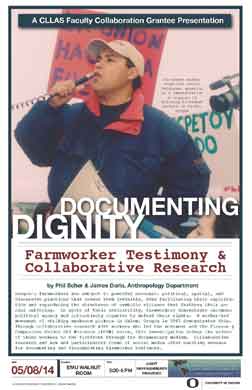Faculty Collaborative Research
Documenting Dignity: Farmworker Testimony and Collaborative Research, by James Daria
 According to the Oregon Farm Bureau, agriculture is the second-largest industry in the state, generating about $5.4 billion dollars annually. More than 100,000 farmworkers labor intensively in the fields to prepare, plant, and harvest the agricultural products so essential to the state’s economy. Despite their importance, however, Oregon’s farmworkers are subject to powerful economic, political, and discursive practices that render them invisible. This invisibility is part of the symbolic violence at work furthering their suffering and leaving their claims to citizenship and inclusion unheard.
According to the Oregon Farm Bureau, agriculture is the second-largest industry in the state, generating about $5.4 billion dollars annually. More than 100,000 farmworkers labor intensively in the fields to prepare, plant, and harvest the agricultural products so essential to the state’s economy. Despite their importance, however, Oregon’s farmworkers are subject to powerful economic, political, and discursive practices that render them invisible. This invisibility is part of the symbolic violence at work furthering their suffering and leaving their claims to citizenship and inclusion unheard.
Thanks to a collaborative grant between the Center for Latino/a and Latin American Studies (CLLAS) and the Pineros y Campesinos Unidos del Noroeste (PCUN), I am using digital media to help tell the story of an epic farmworker struggle in the heart of Oregon’s agricultural and political heartland. In 2000 in Salem, Oregon, a group of 40 to 50 mushroom pickers working at the Pictsweet plant walked off the job conducting a worker-led wildcat strike. Their demand was dignity, an end to mistreatment, and union representation. Unique to this effort was the high level of political agency and self-directed organizing by the workers themselves. For a couple of years, striking immigrant mushroom workers gained widespread media attention as they organized a national campaign to redress their grievances. Although eventually losing their demands, the episode was a catalyst for change in the treatment of farmworkers in the state and an important legacy of struggle.
As a farmworker organizer and immigrant rights activist, I was sensitive to the extreme level of political sophistication and technical skill of the people who harvest our food. Having worked closely with farmworkers, my conversion to their cause was largely the result of hearing their testimony and experiencing their backbreaking labor first hand. As a researcher, I am interested in using the power of new media in documenting farmworker testimony and its use in the classroom and beyond. Combining collaborative research with digital video production created new avenues of investigation and forms of dissemination. I hope that this project will be a small contribution to the growing body of research being conducted on the campus of the University of Oregon in collaboration with the state’s farmworker population.
—James Daria is a PhD candidate in the Department of Anthropology at the University of Oregon. Daria received a 2013 Faculty / Collaborative Research Award from CLLAS to work in cooperation with Phil Scher, associate professor, UO Department of Anthropology, and Samantha King, PhD candidate, UO Department of Anthropology.
